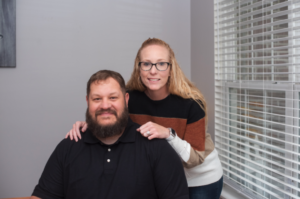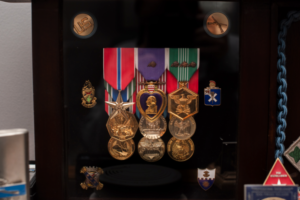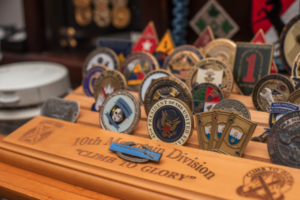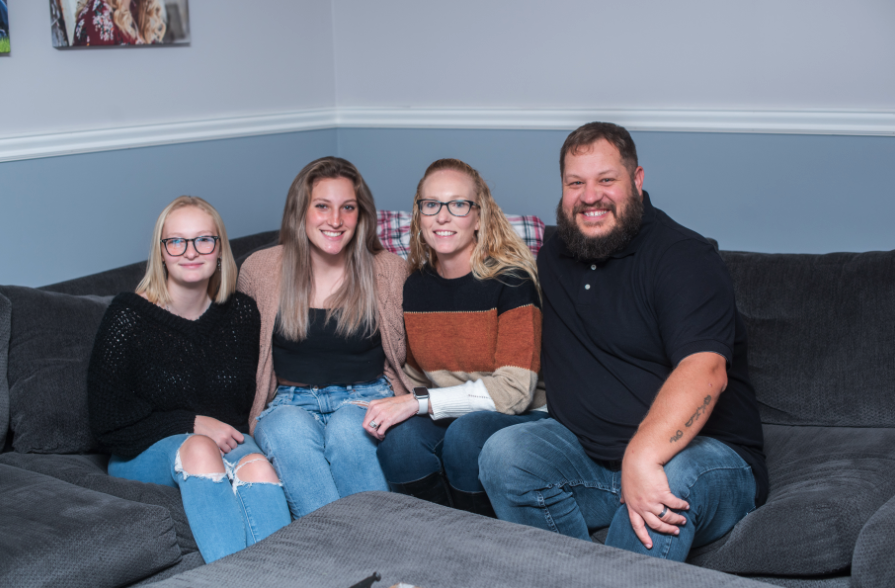Russell Broughton Talks Military Career and Post-Service Life
Photography Provided

After graduating from high school, Russell Broughton went to Indiana State University for a year, but he never really felt like college was a great fit. Then one day, out of the blue, an Army recruiter called and encouraged him to enlist.
“My mom’s dad was in the Air Force and was a Morse code guy,” Broughton says. “My dad’s dad was infantry in World War II so I was intrigued.”
Broughton joined the Army on September 3, 2001, just eight days before 9/11 rocked our world.
“That changed the whole scope of my career,” says Broughton, who graduated from basic training in January of 2002, then went to Airborne School at Fort Benning where he learned how to jump out of an airplane. Following that training, he was stationed in New York, and in September of 2003 he was deployed to Afghanistan. Before that, in April of 2003, he married Kristi, whom he had known since high school.
In total, Broughton served four tours in Iraq. His first deployment was 14 months long.
“When I came back, the Army was reshuffling how they did things, organizing their combat teams as they were trying to figure out how to deal with two wars at one time,” Broughton says.
He got back in October of 2004 and was deployed again in June of 2005. A year later in June of 2006, he was riding in a vehicle when it was hit by an improvised explosive device. Unconscious for an hour and a half, he then remained hospitalized in Iraq for two weeks. When he redeployed for the third time, he was once again injured when a truck bomb was driven through the front gate of his base and detonated. Broughton fractured his pelvis and was medevacked to Walter Reed National Military Medical Center, where he stayed for two months.
 Though there was a level of fear in re-enlisting for a fourth deployment, Broughton wanted to serve his country for as long as he was physically able to do so.
Though there was a level of fear in re-enlisting for a fourth deployment, Broughton wanted to serve his country for as long as he was physically able to do so.
“I can’t say my wife was overjoyed that I re-enlisted after I was hurt,” says Broughton, who was gone four out of the first eight years they were married.
Broughton was in a wheelchair at first as he rehabbed his way back to mobility. When he was stationed in California in 2013, he struggled physically because the infantry is a strenuous job that requires a lot of running and carrying.
“My injuries caught up to me and I could no longer physically do what I used to, so I decided to get my hip fixed,” Broughton says.
He was thrown a curveball, however, when routine blood work revealed that he had focal segmental glomerulosclerosis, a condition in which filters in one’s kidneys wear down and stop working. In short, his kidneys were functioning at 40%.
“This was a huge surprise,” says Broughton, who was just 32 at the time. Once he learned how sick he was, surgery to fix his hip was off the table. The doctor told him it was a matter of time before his kidneys failed. Because the condition was irreversible, in December of 2013 Broughton was medically retired from the Army. By March of 2014, he was extremely ill.
“I was exhausted and nauseated every day,” Broughton says. “My ankles and calves swelled because I was retaining fluid, and my skin was gray.”
In May of 2014 he started dialysis at a veterans hospital, where he was the youngest patient by 25 years.
“Dialysis is way more difficult than anything I ever did in the Army,” Broughton says.
Though he desperately needed a new kidney, he wouldn’t let his wife be a donor because he knew his condition could be passed on, and he wanted to be sure that if one of his daughters had issues, Kristi could potentially be a good match. His parents and several friends got tested, but no luck. In February of 2015 he got an infection in his port and ended up in the hospital with sepsis. Within two days, he was at death’s door.
 He was on a transplant list, but he knew full well how many people die while awaiting a transplant. Though it was a long shot, he posted a plea on Facebook requesting a donor.
He was on a transplant list, but he knew full well how many people die while awaiting a transplant. Though it was a long shot, he posted a plea on Facebook requesting a donor.
“It was my Hail Mary pass,” he says.
His condition improved enough for him to be discharged from the hospital, but he was still hurting greatly. Three months passed and then one day a man named Andrew Coughlan, another Army veteran who had served with him during his first deployment, contacted him.
“I saw your post on Facebook,” Coughlan said at the time. “I’ve been doing these tests without you knowing, because I didn’t want you to get your hopes up. Turns out, I’m a match.”
The two men had been in the same company but had served on different missions. They didn’t go to basic training together or serve in the same platoon. Still, despite not being close, they were brothers. Coughlan told Broughton that during the motor attack that left Broughton wounded, Coughlan’s sergeant passed away, but not before shielding Coughlan with his body, thus saving Coughlan’s life. Donating his kidney to a fellow soldier was his way of paying it forward.
In May of 2016, Coughlan flew up from Florida for the transplant.
“It immediately took and I’ve had no issues,” says Broughton, who couldn’t be more thankful for Coughlan’s selflessness. “He saved my life and provided me with the ability to see my kids grow up.”
His girls, Abigail and Sophia, are now 17 and 13 respectively.
During his time in the military, he received two Purple Hearts and a Bronze Star Medal, a high-level honor given for outstanding leadership.
Though Broughton will forever appreciate the brotherhood of the military, he admits that it was difficult trying to be a father and a husband while also having to go to war.
“I had to come home to my daughters and wife and be kind and attentive to their needs, then a week later go into a war zone and make split-second decisions that could cost somebody their life,” Broughton says. “It’s almost like I had to be two people.”
Serving in a war undoubtedly affects anyone, and often soldiers feel like they have to stuff down their emotions despite struggling on the inside.
“For me personally, I’ve lost just as many soldier friends to suicide as I have to combat,” Broughton says. “It’s been seven years I’ve been out of the military, and friends are still taking their lives.”
He describes the infantry as a proud division whose members are often reluctant to seek help.
“It was frowned upon to ask for help years ago, but people are now realizing this is a huge problem,” Broughton says. “It took me getting blown through a wall and fracturing my pelvis to admit that I have some issues I needed to talk about. It shouldn’t take something catastrophic to reach out for mental health help.”
As he was getting dialysis, he went back to school to earn his college degree. Now he’s a staff accountant at the Kemper CPA Group. He’s also a homebody who enjoys watching movies and spending time with family.
“I’m not a fan of crowds,” Broughton says. “That was true even before COVID.”
As for future plans, mostly he’s just excited to watch his kids grow up.
“Kristi and I put everything we have into our daughters,” Broughton says. “That’s what matters most.”




